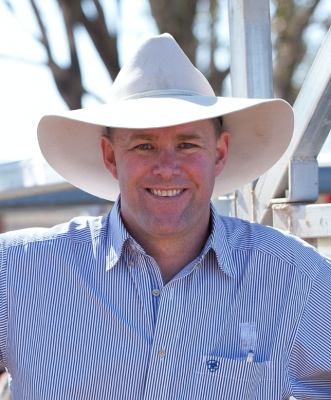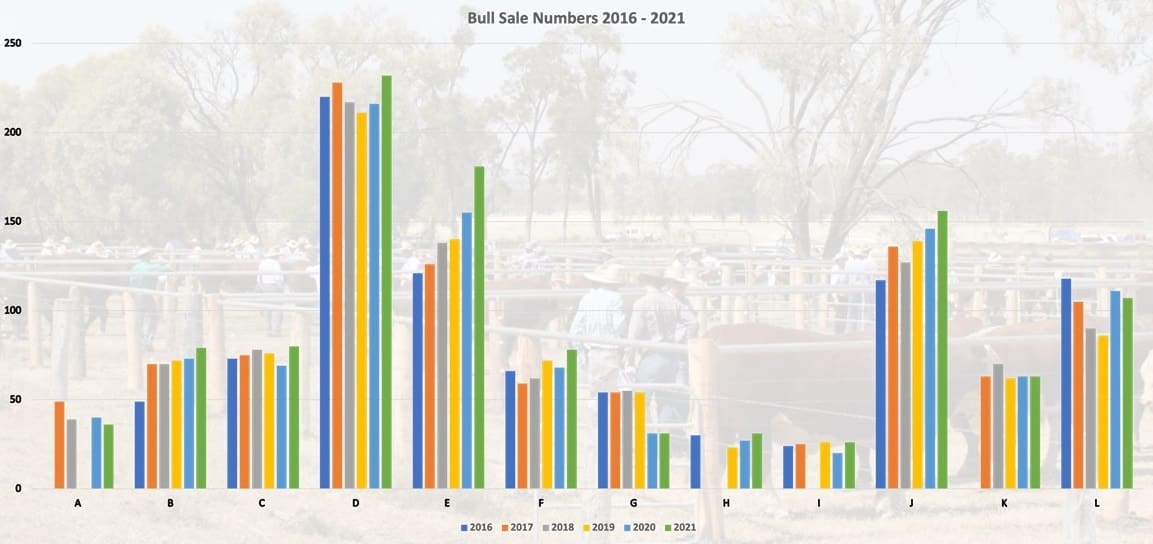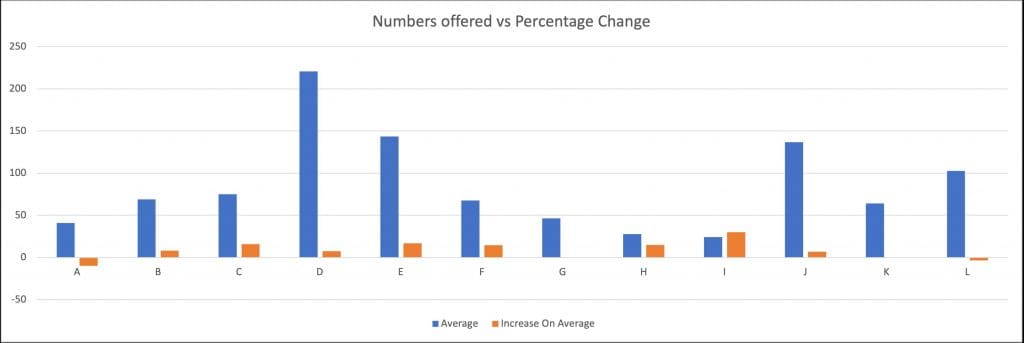THE strength of the 2021 bull sales is largely attributed to the confidence producers feel in the industry. This confidence is due to the strong market prices across all descriptions and markets for cattle. The season and the need to rebuild herd numbers have also contributed to the confidence and demand for new bulls.
The flow-on impact of the lengthy drought across eastern Australia has been noted by leading agents including John Settree of Nutrien, and Harvey Weyman Jones of GDL. Both remarked on how bull numbers in catalogues reflect the herd reduction decisions that were made in 2019 and early 2020 due to drought.
John Settree commented earlier to Beef Central that “the bulls that have been kept to sell in 2021 are the best of the best. Those bulls that were not up to scratch for type, temperament or anything else were taking out and sold, very early on.”
Harvey Weyman Jones supported those comments and noted that in addition to lifting the overall quality of bulls on offer, there have been other changes to the availability of bulls.
“There are less paddock bulls in programs* after sales this year,” he said. “In recent years there was always a few available after the sale. This year, any bulls that have come through from 2019 are in the catalogue for auction.”
Looking over the past five years, it is possible to assess the changes of bull numbers offered by breeders for auction. Looking over 11 randomly-selected northern NSW and southern QLD stud sales (identified as A-L) in the graph below), the numbers offered between 2016 and 2021 have remained reasonably consistent – despite the dramatic contrasts in seasonal conditions.
The numbers offered (as reported in Beef Central’s bull sale data) shows most operations have maintained remarkably similar sale numbers over the past five years. Apart from slight drops in 2018 and 2019 when severe drought conditions had the greatest impact on production, overall, the trend for bull numbers appears to be positive.
Another way to look at the data is to consider the number of bulls offered by these 12 studs in 2021, and how they reflect on the average offered over the past five years. The data, provided through Beef Central’s records (click here to access), suggest that most programs in 2021 increased their offering numbers slightly. Only two operations offered less than their usual average, and one maintained a static number over the timeframe.
There are perhaps two take home messages from this data for beef producers.
Firstly, there should be a degree of reassurance that bull numbers appear to remain reasonably constant, with no dramatic drops or increases. This suggests that while bull breeders are working to grow the numbers they are offering each year, it does not appear that growth is being achieved to the detriment of quality.
Secondly, the ability of the majority of breeders to avoid large drops in numbers, even during significant drought years suggests strong commitment to maintaining supply and supporting the broader industry and customer base. It also suggests that there are generally enough bulls in the system to meet demand from breeders.
The data would also appear to support the proposition put forward by agents such as Harvey Weyman Jones and John Settree regarding the availability of paddock bulls*. These bulls are not normally included in sale data. However, it is reasonable to assume that one strategy some breeders have used to maintain numbers in catalogues is to reduce the paddock bull group to a much smaller cohort.
For planning purposes, producers will have to assume that while bulls will be available at auction, the usual supply of back-up and paddock bulls* left behind after sales is less certain. It is possible that this could be a trend that may occur again in 2022.
* Comments relate to typical bull breeders in central and northern NSW and southern QLD – not Central and North QLD where specific paddock sales remain common.
 Alastair Rayner is the Principal of RaynerAg, an agricultural advisory service based in NSW. RaynerAg is affiliated with BJA Stock & Station Agents. He regularly lists and sell cattle for clients as well attending bull sales to support client purchases. Alastair provides pre-sale selections and classifications for seedstock producers in NSW, Qld, and Victoria. He can be contacted here or through his website www.raynerag.com.au
Alastair Rayner is the Principal of RaynerAg, an agricultural advisory service based in NSW. RaynerAg is affiliated with BJA Stock & Station Agents. He regularly lists and sell cattle for clients as well attending bull sales to support client purchases. Alastair provides pre-sale selections and classifications for seedstock producers in NSW, Qld, and Victoria. He can be contacted here or through his website www.raynerag.com.au


